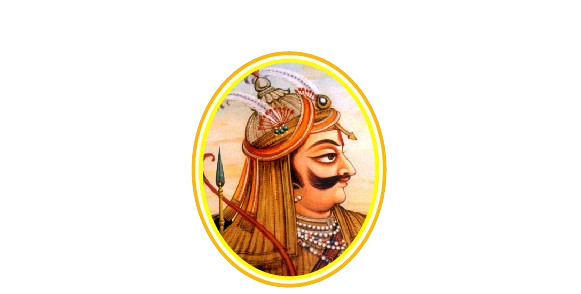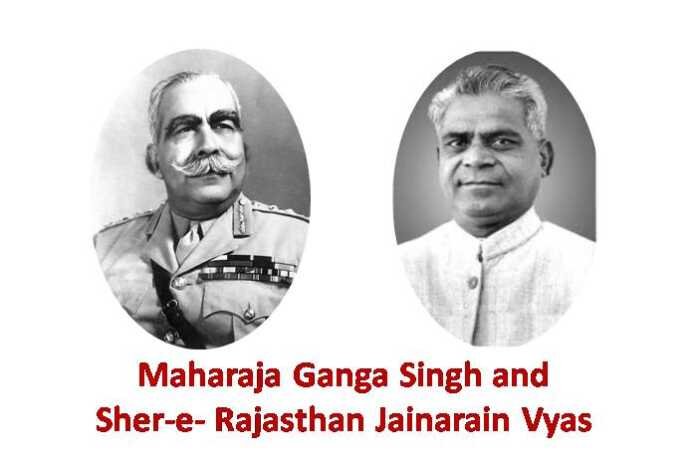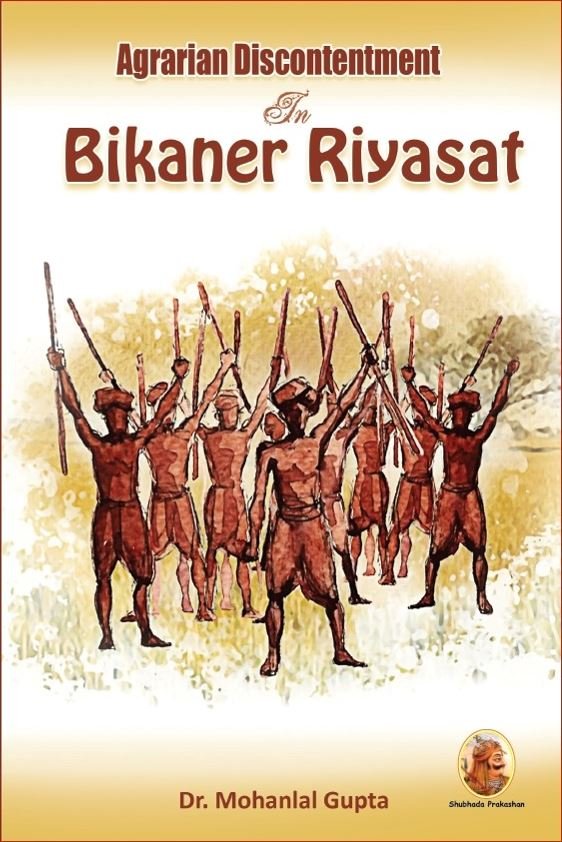Maharaja Ganga Singh and Sher-e- Rajasthan Jainarain Vyas were owing different personalities but there was a great connection between them for which history doesn’t have any explanation.
Maharaja Ganga Singh was one of the most outstanding and forceful personalities of the princely order of India. He was an elderly statesman of the British Empire, a man of ability and energy, vision and leadership, gifted with a rare flair for politics.
When Ganga Singh ascended the throne, the state of Bikaner was almost a barren desert, full of sand dunes, and without any rapid means of communication and transport. It was he who ushered in a new era of progress and prosperity in his state.
By ordering the digging of the Gang Canal and by tapping other resources of water in this area, he converted a great part of the desert into a smiling garden and a pleasant cornfield. Though the financial resources at his command were inadequate, the Maharaja, by his political sagacity, administrative acumen and incessant efforts helped his state march towards modernity.
Ganga Singh steered the ship of the state admirably and laid the foundation of progress in the State of Bikaner. He personally supervised public works, Education, Medical relief, extension of railways, rural uplift, co-operatives, agriculture and provided modern civil amenities to the people.
Maharaja carved out a place for Bikaner in the map of the country and earned for himself a place of distinction in world affairs. Lord Linlithgo, the Viceroy of India, remarked in 1937- “Indeed, I know of no ruler of an Indian State in modern times, who has by his individual efforts done more for his state and his subjects than Maharaja Ganga Singh”.
Maharaja Ganga Singh was a man of an autocratic nature. He believed, indeed, in the theory of absolute monarchy but he was not oblivious of the past nor unaware of the historical process which was in progress at that time in India.
He could read the writing on the wall and accordingly advised his fellow princes to humanise themselves and mellow down their autocratic rule. Maharaja Gangasingh, a practical historian as he was, studied the past to understand the present and with the knowledge of the present, he was in a position to look ahead, to foresee the coming events and properly visualize the future.
Gradually, as his age advanced, he was coming round to the view that, sooner or later, the princes will have to share power with the representa- tive of the people and ultimately a time will come when a complete eclipse of the princely order in India could take place.
Maharaja’s confidential letter written to Sir D.M. Field, the Chief Minister of the erstwhile Jodhpur State, bears ample testimony to his clearsightedness and reveals his new chain of thinking. [1]
The above letter was written with a purpose to impress upon Sir Donald Field the fact that he should be instrumental in the growth of honest leadership – that of Jainarain Vyas – the foremost among the freedom fighters of Rajasthan – who was a ruthless critic of the autocratic princely order of India. It appears from the text of this letter that he had reconciled himself with the inevitable. The Maharaja writes “……. Neither the glorified pillars of the princely order nor the loftist among the regence bucks are going to survive these proletarian fire-brands, ….. the administration of the princely states now being looked after by us will ultimately pass over to our enemies.”
Though Jainarain was a bitter and merciless critic of Maharaja Ganga Singh and his administration, yet the Maharaja had a very high opinion of and a great regard for Jainarain Vyas. The reason why he was so impressed by the latter has been given in the letter itself – “He (Vyas) is thoroughly honest, incorruptible and true to his conscience and political creed, amidst tens and thousands of cheats, bad characters and dishonest hirelings who profess themselves as politi- cians, shastries and misguide the millions of God-fearing people inhabiting the Indian States……..”
The background of the above letter is as follows. The Maharaja was shocked when he heard that Jainarain Vyas, obliged by circumstances, was to close down his ‘Akhand Bharat’ – a Hindi daily, published from Bombay and was thinking of joining the Cinema Industry as a composer of songs (Geets) or even as an actor since, besides being a fearless journalist, he was also a good dancer and musician.
The prospect of Jainarain Vyas getting out of politics cinema was not at all palatable to the Maharaja.He writes to sir Donald in the letter, “Inspite of the fact that he has been my worst enemy, he is being considered by me as a noble soul” – one who, by his relentless efforts, will bring one day peace and prosperity to these arid zones of Rajputana. We may perhaps be happy over his down-fall to-day, but that day is fast approaching when we will realize that he alone could fill the vacuum created by our retirement”.
The Maharaja had an ardent desire to meet Jainarain Vyas personally and exchange views with him. He writes in the letter “I wish I could catch hold of Jainarain Vyas and sit together with him alone on the rolling sand dunes of Rajputana and have a heart-to-heart talk with him regarding the unheard of abuse he has so often hurled upon me through the press and the platform.
We may agree to disagree or even disagree to agree but, though standing on the parting of waves, drifting towards opposite directions, we shall any how realize that despite our mental illusions and fierce misgivings, we both, in our own way, aim at realising the social good and promoting the welfare of the millions at large. It is true that we go to represent different types of interests but there is no reason to believe that, if interests clash, one set of interests is to be swept away”.
The Maharaja offered Vyas financial assistance amounting to one lakh rupees for establishing a press of his own and starting a new paper. He also sent him a message to the effect that he would be free to criticise him (the Maharaja) and added that it has been the ideal of the ancient Kshatryas to supply a sword to his enemy, if armless, to He preferred to fight. Vyas boldly refused to accept this sum. He preferred to fight with a broken sword rather than to accept a sword from his enemy.
Sir Donald was a true disciple of Walpole – the de facto first Prime Minister of England who believed in the dictum that every manhas his price.
Sir Donald Field, the Chief Minister of the Jodhpur State, sent an offer to Shri Vyas,asking him to join his cabinet as a minister, in his personal capacity,a with all the perquisites and the samepay that he himself was enjoying. Vyas refused point Blank. He was sent to Jail soon after.He His sincerity as a public worker, his spirit of self-sacrifice, his sterling character and noble virtues received a genuine admiration from his friends and foes, admirers and critics alike.
Thus, we see that both these persons were entirely of a different type and character and had a different upbringing. And yet both of them were great in their own way.
[1] No. 201 P 54-37 dated 21 February, 1937,





